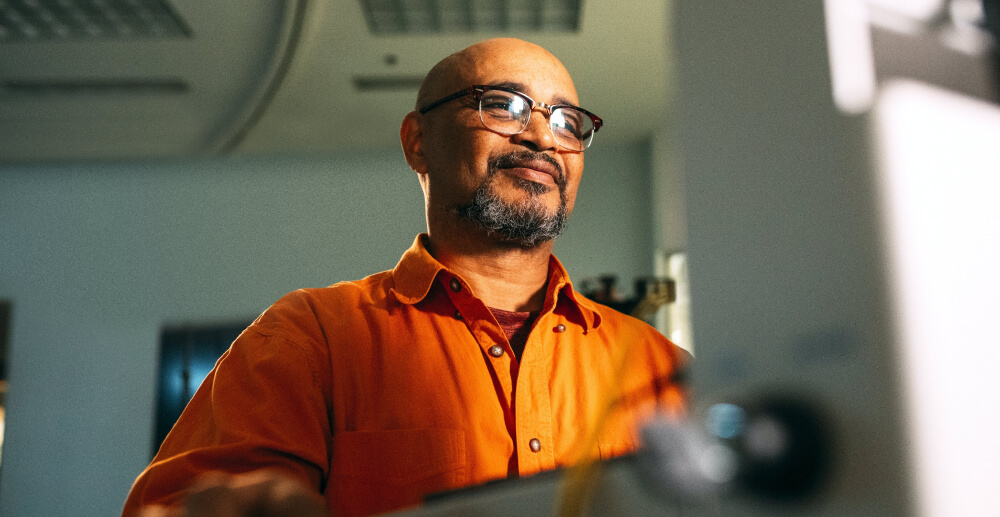Meet Doctor Kevin Armington, a key member of the Workit Health Team in New Jersey.
Can you tell me about your experience? What made you want to work in the addiction field?
I took a circuitous route to the practice of addiction medicine by way of AIDS activism in the 1980s. After college, I moved to NYC and worked at an organization that provided support to people with AIDS. My job was to help put out a newsletter on experimental treatments for AIDS and its complications. Surprisingly, I found myself becoming really interested in viruses and medicine. Eventually, I realized that I wanted to actually give care to people, not just write about it, so I went to medical school and trained to be a primary care provider. My first job was in a clinic for homeless patients with HIV infection. As you can imagine, addiction was common in this community. Actually, as I learned along the course of my career, addiction is common in EVERY medical practice, if you look for it. By the time I had finished my training, the dawn of triple-drug therapy for HIV infection (known as “highly active antiretroviral treatment”, or HAART to its friends) had arrived. These multidrug cocktails arrested HIV progression as nothing else had in the prior 15 years, but there was a catch: it involved lots of pills and there were lots of side effects.
Furthermore, patients had to be unbelievably adherent to taking every single dose. This might mean taking 10 pills three times a day, on an empty stomach, while drinking several gallons of water daily to avoid getting kidney stones. How well is someone with active addiction going to be able to handle this kind of treatment regimen with something approaching 100% adherence?? Not well, in most cases! So many of my patients first got better, then quickly got worse because they had developed resistance to these early drugs. Now, we get to addiction medicine. In order to treat their HIV or diabetes or high blood pressure or asthma, I had to help them address their addiction issues. In a sense, I became an addiction medicine practitioner so I could be an effective primary care provider. Only later did I realize that treating addiction would become the focus of my career.
Workit strives to be different than the traditional 30k rehabs. What about Workit stands out as different in your eyes?
The first thing that comes to mind is Workit Health makes it EASY to get treated for addiction. When I began treating addiction disorders, there was nothing easy about it. Most of us didn’t get enough training on how to screen patients for addiction disorders or how to talk to them about it. The treatments we had were not good (think Antabuse). A lot of insurance plans wouldn’t pay for inpatient treatment. Just being able to refer patients to needle exchange programs was a huge step forward. Workit Health’s model removes so many obstacles and makes a very effective treatment available to a patient no matter where they live in the state. The patient is in the comfort of their own space, they see an experienced addiction specialist without being screened by 5 people first, in most cases they start treatment that day and they feel better over the next 24 hours. As far as I’m concerned, this should be the gold standard: a model that gets effective medication in patients’ bodies quickly. With addiction, we are usually dealing with narrow windows of time when people are able to outrun their addiction and are open to help. If you don’t engage that patient quickly and give them a reason to stick around, you will lose them.
Another thing that stands out about Workit Health is that support staff is very accessible to patients. Patients can submit a chat that is seen and responded to that day. They have access to lots of IT people who can help troubleshoot technical problems. The emphasis on counseling and education are strengths of our treatment model.
Many of us in recovery have previously had negative experiences with clinicians and the medical field, often because we’ve had fear around disclosing our struggle with addiction. Do you have any tips on how those of us in recovery can begin to trust the clinicians or programs that are providing our care?
Number one, try to overcome any feelings of shame you have about addiction. It is something that happened to you, not something you chose to do. You have had the integrity to face it head-on and you deserve respect for your honesty and efforts. Talk about your struggle with drugs or alcohol and your recovery with the same tone you would use to talk about any other medical problem you experienced. Give the medical provider the benefit of the doubt and assume you will get a positive reception. At some point in the history taking, the medical provider should ask about alcohol and drug use and that is a good time to say, unapologetically, something like “I no longer use (alcohol or drugs) and I have been in recovery for XX time.” If they do not ask about alcohol and drug use, a good time to bring it up would be when they are asking about your past medical history.
Example: Medical Provider: “Do you have any medical problems?”
You: “I have a history of (addiction to xx, alcoholism) but I have been in recovery
for XX time.”
The medical provider should ask some details about your use in the past, treatment, and what you are doing to maintain your recovery. Be forthcoming. If you sense a hesitant or negative response when you disclose your addiction, you need to decide if you can work with this person or if it might be better to find a different medical provider. Not all medical providers have enough training in addiction medicine and some carry prejudices. I think this is getting better, but I definitely still see it. Trust your gut. If your new medical provider does not know much about addiction and recovery but receives your news with an openness, is curious and non-judgmental, it is probably worth continuing to work with them. They should be comfortable asking you questions; do not assume this is a bad thing – it means they are open to learning about addiction and getting to know you better. But if you sense judgment, don’t hesitate to look for another medical provider. If you keep seeing the medical provider and start using again, don’t be afraid to let them know and remind them that addiction is a chronic disease if they seem surprised.
What do you wish you could tell people about addiction, that is most commonly misunderstood?
In my experience, many people see addiction as a character flaw or weakness that could be solved if only the person who has it would make enough effort. The message I have for people who don’t know much about addiction is:
- Addiction is much more prevalent than most people realize and plenty of people with addiction continue to function in their lives as if nothing were wrong. So I would say that addiction is everyone’s problem, we are all affected by it whether directly or indirectly, and we all have a stake in getting it out of the shadows and making treatment accessible.
- Stopping drug or alcohol use is not simply a matter of will power. Addiction is a disease that has powerful physical and psychological effects on people who have it and these effects need professional intervention, often including medication.
- Addiction is a chronic illness, like high blood pressure or diabetes. I have never treated a patient with a chronic medical illness that they are able to control 100% of the time. So, it makes sense that people with addiction may backtrack sometimes and start using again. In fact, this is the norm. When a person starts using again, they need compassion and care, not judgment and shaming.
- Even though we have effective treatment, many people with addiction cannot access it for lots of reasons. They may not know that medication is available. Perhaps the nearest medical provider who can prescribe medication is too far away. Their state Medicaid program may not cover it and they can’t afford to pay for it out of pocket. We have work to do as a society to ensure that all patients with addiction are able to access effective treatment.
Self-care is so important when you spend so much time caring for others. What is your favorite thing to do to practice self-care?
So important, so often neglected! My favorite thing is probably playing the piano and I do that most days. As a medical provider, I feel that I have to practice what I preach, so I exercise regularly and meditate most mornings. Favorite indulgent self-care activities: cooking (then eating), and watching TV with my husband!
Each local landscape seems to be tackling the opioid crisis differently. What do you think is unique about New Jersey?
I would say the things that make NJ unique are mostly good. Needle exchange was embraced here earlier than in other parts of the country. The state Medicaid program is much more progressive than in many states in terms of covering addiction treatments. Some of the challenges include the large population of immigrants with no health care coverage and our proximity to NYC where many of the trends in the drug-using community start out. I would also say that the typical NJ resident has a kind of no-nonsense attitude and expects results quickly, so Workit Health is an ideal fit!









